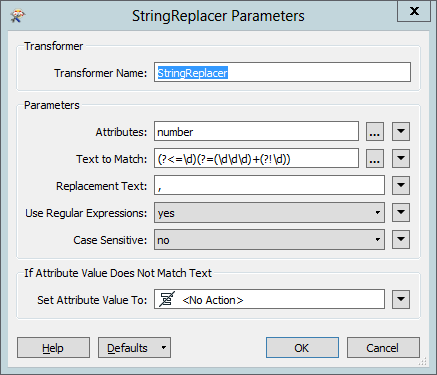Can you convert, with the Stringformatter from
integer = 1000000
integer = 1234567
integer = 234567
to
1 000.000
1 234.567
234.567
?
Or do you have to do some dirty python?
Can you convert, with the Stringformatter from
integer = 1000000
integer = 1234567
integer = 234567
to
1 000.000
1 234.567
234.567
?
Or do you have to do some dirty python?
Best answer by david_r
The StringFormatter seems to be based on the C printf function (doc) which doesn't seem to have thousand separators as a format string. But you can use a StringReplacer:

Modify the replacement text as needed. Regex for copy/paste purposes:
(?<=\d)(?=(\d\d\d)+(?!\d))